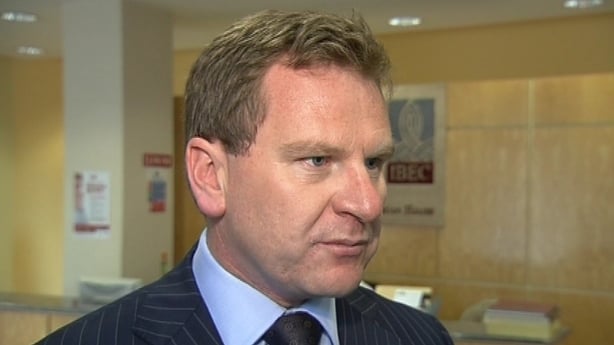The Minister for Finance has said he thinks the biggest challenge facing the next government will be getting the country back to work.
Paschal Donohoe said that while the next government will have many ambitions and challenges, the key for unlocking all of that will be be getting citizens back into employment this year and into 2021 and giving the companies that employ them the greatest chance of a strong rebound.
"We have hundreds of thousands of our fellow citizens this morning who are waking up either without a job or with a job that is paying less than would otherwise have been the case," he said.
"And I think what is so important in recognising the challenge both from an economic and social point of view is the speed with which this has happened and the scale of what has happened as well," the minister said.
Mr Donohoe said Ireland has a multi-tier economy and the question is whether we can harness that to become a source of strength, or whether it will become a source of fragmentation in the coming years.
Speaking during The Business Show, a webinar organised by Business & Finance, Mr Donohoe said he is really optimistic about where Ireland can go to.
But he said hope based on evidence of what the economy has done in the past and where it is now, coupled with realism about the challenges it faces now, are important.
Mr Donohoe said a big challenge will be around giving consumers confidence to spend the more than €10 billion in savings that households have put aside in the last eight weeks and giving confidence to companies to "reassemble and restructure themselves."
In relation to the supports put in place by the Government to help businesses, such as the wage subsidy scheme, Mr Donohoe said he absolutely understands that they have played a critical role in ensuring the viability of employers across the country.
"I understand that the rapid adjustment of that scheme has the potential to yield a very pyrrhic victory from a national finance point of view," he said.
"My concern is two-fold in relation to the future of the wage subsidy scheme. Understandably, I want to get to a point in the future where a scheme like that is no longer needed, or if it is needed it is significantly smaller and different.
"But on the other hand I can't get to that point with a speed that means that a half a million people who are currently depending on it find that the company they are working in or the employer they are working for can no longer survive without that scheme," he added.
Mr Donohoe said it is therefore about pacing and getting the balance right.
He said he knows that more will be needed be done around supports and one of the reasons he is eager to get a new government formed is so it can play its part in that happening.
But he also cautioned that the next government would not be able to meet every need that is called for.
On Brexit, Mr Donohoe said there will be some very difficult decisions and challenges that will have to be worked through during the second half of the year.
But he said he has lost sight of the number of times in recent years where there were moments where progress looked so difficult, but it had been possible to work through those challenges and "we are going to have to do that again" he added.
Ibec's chief executive Danny McCoy told the webinar that his members are very pleased to be getting back to the reopening phase of the economy and there is a fair bit of confidence about that.

But he said that while demand is coming back in some sectors, it will be inconsistent for a while.
"So I think around issues around hospitality, issues like the metre distancing, the quarantines, and so on, more clarity on that sooner I think will help with that confidence," he said.
He added that he thinks Ireland had a strong business model going into the crisis, with public finances that had been well managed. In contrast to other jurisdictions we are in a much stronger place, he said.
"Our capacity to bounce back is very strong, but all the time we need to be sensitive around the possibility of a second wave," he stated.
He said the reopening roadmap and some confidence around having a government to legislate will help with confidence.

